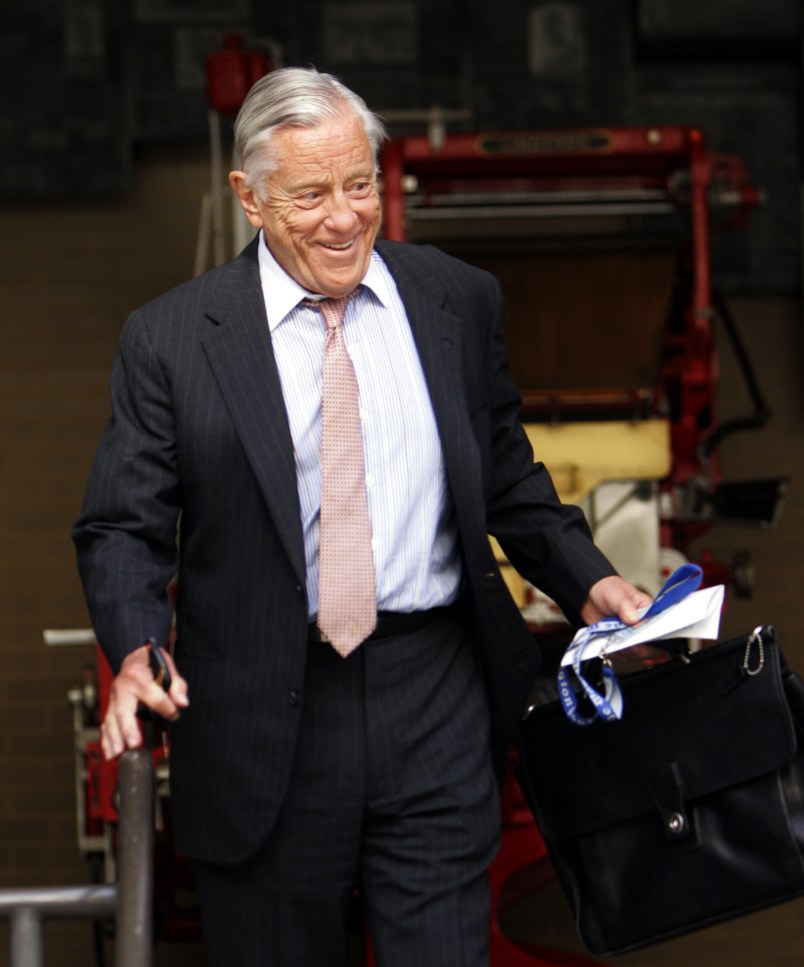I have always thought that Ben Bradlee was the rebel and swashbuckler that All the Presidents Men made Woodward and Bernstein seem to be. As you have no doubt heard, Bradlee died today at the age of 93. The AP obituary captures some of the jauntiness of the man with the first line. “In a charmed life of newspapering, Ben Bradlee seemed always to be in just the right place.” As he so often does when he takes to the keyboard, David Remnick, a one-time employee, has an almost perfect evocation of the man in this piece just published at NewYorker.com.
Remnick keys in on a couple essential points about Bradlee: one is that the effortless, almost imperial authority, lack of ‘transparency’ (a very, very contemporary pretension), various conflict-ridden friendships (the one with John Kennedy being the most important) – all of these wouldn’t survive first contact with our current reality. In some ways good, in some ways not so good.

Katharine Graham and Ben Bradlee leave U.S. District Court in Washington, D.C., on June 21, 1971.
The other, according to Remnick, is that Jason Robards – who is probably the instinctive Bradlee for many of us who didn’t know him – actually underplayed the guy. He was more over the top and had bigger clanging balls than the movie suggested.
Here’s the nub of Remnick story about trying to explain a story to Bradlee and assuage his concern …
“Well, I’ve been reporting a lot and calling … ” And blah, blah—in my nervousness I went on, explaining the intricacies of reporting to Ben Bradlee for three or four minutes. And to Bradlee, who had the attention span of a gnat, this was three-quarters of eternity. Finally, I ended the ill-advised aria with the most ill-advised words of all: “… and so don’t worry.”
The soles of his shoes parted. He sat up in his chair. I could see his face, and he was, for a moment, a threatening sight. And then he smiled, fantastically, and said, “What! Me? Worry? I am a dangerous man.” He led me back to the door. “So get the fuck outta here,” he said. “And get back to work.”
In other words, I’m Ben Bradlee. I don’t worry. Other people worry about me! I am a dangerous man.
The only halfway interaction I had with Bradlee came two years ago when I was on a panel with Woodward and Bernstein and a few others. The subject was something about the state of journalism and investigative reporting. It may have been one of the various 40th anniversaries of Watergate. I don’t remember precisely. But it became clear to me pretty quickly that I was there as the new media foil for W & B’s old school, shoe leather. I made my points – in one exchange told Bernstein he really didn’t know what he was talking about with any journalism after the end of the 20th century. (Very true, going by his contributions on the panel.)
Then at one point, as these two princes of journalism royalty were reminiscing and patting themselves on the back, they invoked Bradlee who was actually sitting there in the audience in the front row. They started going back and forth with him, sort of a colloquy from the stage to the front row because, remember, they’re Woodward and Bernstein and he’s Ben Bradlee.
By this point, Bradlee was quite, quite old. And it showed, both in his physical presence and in his words. (I think Don Graham may have been sitting with him; but I’m fuzzy on that point.) And yet I quickly became aware that Bradlee, trapped as he was in a rapidly declining body, had a measure of zest and punch in him that these two guys a generation younger themselves lacked.
 May 29th, 1963 The President and Mrs. Kennedy with Mr. & Mrs. Benjamin C. Bradlee. White House, Family Living Room. Photograph by Cecil Stoughton.
May 29th, 1963 The President and Mrs. Kennedy with Mr. & Mrs. Benjamin C. Bradlee. White House, Family Living Room. Photograph by Cecil Stoughton.
And this is the Bradlee thread that holds my attention – all the talk of spark and luck and bravado. I’m reminded of Oliver Wendell Holmes line on FDR, A second rate intellect, but a first rate temperament!
I don’t mean this as a knock on Bradlee’s intelligence. I know nothing about that. But on temperament, by God, there’s no question. And when you hear about being Kennedy’s pal and telling this and that person off, helping to topple a president and reining over the Post newsroom with all that swagger and winning charm, you realize that Bradlee – deeply American but also from one of those born-to-rule families – was an epitome of that mid-late 20th century America when men (and I very much mean men) could bestride their worlds with a happy swagger and effortless charm, much as America itself did upon the actual globe. Nor was it empty. This wasn’t just unquestioned and insubstantial entitlement; Bradlee, with Katherine Graham, helped forge a great, late 20th century journalistic institution.
And yet, the Bradlee history knows and Bradlee’s Post and so much else about that era and his role in it could hardly exist with the demands and equalizations and levelings of power we correctly require today and in many ways simply take for granted. But for a handful of decades, for a certain group of people, almost everything was possible. And that power and possibility bred a confidence and an swashbuckling charm which was, and remains for many, irresistible.






